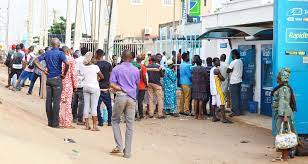Banks and PoS operators under investigation over second naira scarcity in 12 months
By Jeph Ajobaju, Chief Copy Editor
Banks and Point of Sale (PoS) operators are being investigated by the Central Bank of Nigeria (CBN) over the second naira scarcity within a year that repeats the hardship created during the first cash crunch between December 2022 and March 2023.
The investigation was announced in a statement issued by the CBN on Thursday.
“The attention of the Central Bank of Nigeria has been drawn to alleged cases of collusion between some Deposit Money Banks and Point-of-Sale operators affecting the availability of cash and disrupting the seamless circulation of the Naira,” the statement said.
“The CBN frowns at such inappropriate actions by certain individuals and is investigating the reported cases capable of undermining the smooth running of the economy.
“The CBN has, therefore, warned banks and PoS operators to desist from such activities as relevant sanctions shall be meted out to those found wanting.
“Meanwhile, members of the public are encouraged to use alternative payment channels as well as report any case of unauthorised activities, such as capping and hoarding, by banks or PoS agents to the CBN branch in their locations.”
__________________________________________________________________
Related articles:
Nigerians face naira scarcity again, and can’t link NIN with accounts
Fintechs warn cashless policy may erode trust in banks
Banks and Nigerians blame CBN as naira scarcity gets worse
__________________________________________________________________
Tinubu man Cardoso idling away as Nigerians groan under naira scarcity
CBN Governor Yemi Cardoso, a loyalist of Bola Tinubu, has been talking about the reasons for the latest naira scarcity, but has done nothing to ameliorate the menace taking a toll on social and economic life.
The branch of First Bank on Allen Avenue in Lagos on Tuesday paid customers only N20,000 over the counter. Some other banks have stop withdrawals altogether, saying they cannot get cash from the CBN.
Cardoso has explained the scarcity is caused by cash hoarding by individuals for various reasons. He has been repeating this for about four weeks, a time long enough for him to tackle the problem.
Rather, the cash crunch is getting worse.
Tinubu himself talks ebulliently pretending such a problem does not exist or is not a problem at all – a master at gaslighting folks, especially now that he has achieved his singular aim of grabbing the title of President.
However, farmers and petty traders have expressed frustration over the lack of naira, which is printed in Nigeria, as it is stalling businesses. Some said they have stopped keeping their cash in banks to prevent their funds getting trapped.
Despite assurances from Cardoso there is enough cash in the system, Nigerians decry the scarcity as many Automated Teller Machines (ATMs) do not dispense cash and banks ration it over the counter.
Small and medium-scale enterprise associations and other citizens warned the cash crunch would further weaken Abuja’s effort to drive financial inclusion, especially at the grassroots.
Their views, collated by The PUNCH, are produced below:
Dele Bamigboye (Farmer in Igboho, Oyo State)
“Many of those who bought from my farm produce have not paid me. They said they could not get money from the banks. It is affecting my business. I sell my things in cash and I have someone who helps me to collect the monies and keep in her bank account when it is much. Now, I cannot get cash because my monies are trapped.”
Mama Kudi (Trader in Ogidi, Ilorin, Kwara State)
“I am selling to only those who have cash to pay. I maintain this position because if they send money to my account, I cannot access cash from the PoS, and banks are rationing their cash. I need cash to buy goods and do my transactions. I am not taking money to the bank.”
Despite assurances from Cardoso there is enough cash in the economy, Nigerians decry the cash scarcity as many Automated Teller Machines (ATMs) do not dispense cash banks ration it over the counter.”
Femi Egbesola (Association of Small Business Owners in Nigeria President)
“People are trying to get their businesses structured and take their monies to the bank. With what is happening now, the confidence is eroded, especially at this festive period. People, mostly in the micro sectors, need cash for their daily transactions.
“It is very unfortunate that some of them had to take their monies to the bank, not knowing that a thing like this would happen, and when they are expecting to get their monies from the banks, they are unable to withdraw.
“A lot of transactions in the economy still go with cash. Grassroots business is still cash dependent, and when there is no cash, there will be apathy in going to the bank to lodge their funds.”
Solomon Aderoju (Vice President, Nigerian Association of Small and Medium Enterprises, South West)
“Financial inclusion is to engender opening of accounts to ensure that you don’t keep your money under your pillow. It is also to help the SMEs to have a structured business, and also to control money in circulation.
“But with what is happening now, the confidence is lost. People will not have the confidence to keep their monies in banks.”




